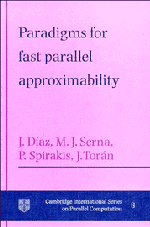Book contents
- Frontmatter
- Contents
- Preface
- 1 Introduction
- 2 Basic Concepts
- 3 Extremal Graph Properties
- 4 Rounding, Interval Partitioning and Separation
- 5 Primal-Dual Method
- 6 Graph Decomposition
- 7 Further Parallel Approximations
- 8 Non-Approximability
- 9 Syntactically Defined Classes
- Appendix 1 Definition of Problems
- Bibliography
- Author index
- Subject index
2 - Basic Concepts
Published online by Cambridge University Press: 19 March 2010
- Frontmatter
- Contents
- Preface
- 1 Introduction
- 2 Basic Concepts
- 3 Extremal Graph Properties
- 4 Rounding, Interval Partitioning and Separation
- 5 Primal-Dual Method
- 6 Graph Decomposition
- 7 Further Parallel Approximations
- 8 Non-Approximability
- 9 Syntactically Defined Classes
- Appendix 1 Definition of Problems
- Bibliography
- Author index
- Subject index
Summary
In the previous chapter, we gave a brief introduction to the topic of parallel approximability. We keep the discussion at an intuitive level, trying to give the feeling of the main ideas behind parallel approximability. In this chapter, we are going to review in a more formal setting the basic definitions about PRAM computations and approximation that we shall use through the text. We will also introduce the tools and notation needed. In any case, this chapter will not be a deep study of these topics. There exists a large body of literature for the reader who wishes to go further in the theory of PRAM computation, among others the books by Akl [Akl89], Gibbons and Rytter [GR88], Reif [Rei93] and JáJá [JaJ92]. There are also excellent short surveys on this topic, we just mention the one by Karp and Ramachandran [KR90] and the collection of surveys from the ALCOM school in Warwick [GS93]. In a similar way, many survey papers and lecture notes have been written on the topic of approximability, among others the Doctoral Dissertation of V. Kann [Kan92] with a recent update on the appendix of problems [CK95], the lecture notes of R. Motwani [Mot92], the survey by Ausiello et al. [ACP96] which includes a survey of non-approximability methods, the recent book edited by Hochbaum [Hoc96] and a forthcoming book by Ausiello et al. [ACG+96]
The PRAM Model of Computation
We begin this section by giving a formal introduction to our basic model of computation, the Parallel Random Access Machine. A PRAM consists of a number of sequential processors, each with its own memory, working synchronously and communicating between themselves through a common shared memory.
- Type
- Chapter
- Information
- Paradigms for Fast Parallel Approximability , pp. 12 - 31Publisher: Cambridge University PressPrint publication year: 1997



